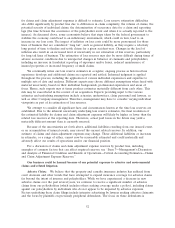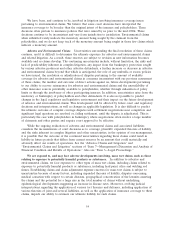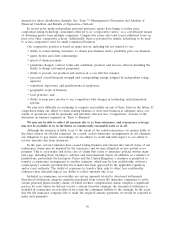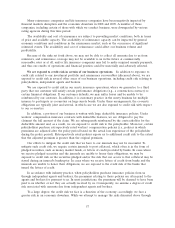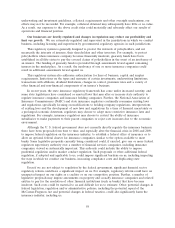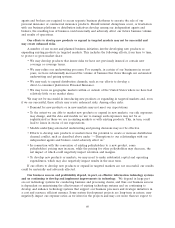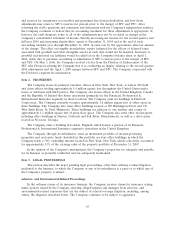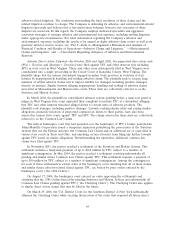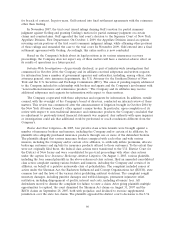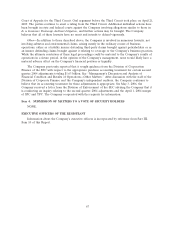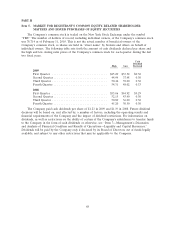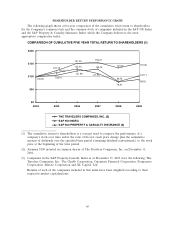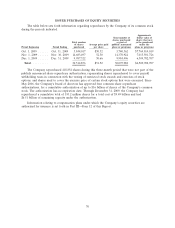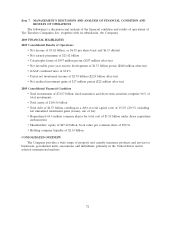Travelers 2009 Annual Report Download - page 74
Download and view the complete annual report
Please find page 74 of the 2009 Travelers annual report below. You can navigate through the pages in the report by either clicking on the pages listed below, or by using the keyword search tool below to find specific information within the annual report.There is no guarantee that any businesses acquired in the future will be successfully integrated,
and the ineffective integration of our businesses and processes may result in substantial costs or delays
and adversely affect our ability to compete. Also, the acquired business may not perform as projected,
and any cost savings and other synergies anticipated from the acquisition may not materialize.
We are subject to a number of risks associated with our business outside the United States. We
conduct business outside the United States primarily in the United Kingdom, Canada and Ireland. We
have also started to explore opportunities in other countries, including in emerging markets such as
India, China and Brazil. While our business outside of the United States currently constitutes a
relatively small portion of our revenues, in conducting such business we are subject to a number of
significant risks, particularly in emerging economies. These risks include restrictions such as price
controls, capital controls, exchange controls, ownership limits and other restrictive governmental
actions, which could have an adverse effect on our business and our reputation. In addition, some
countries, particularly emerging economies, have laws and regulations that lack clarity and, even with
local expertise and effective controls, it can be difficult to determine the exact requirements of the local
laws. Failure to comply with local laws in a particular market could have a significant and negative
effect not only on our business in that market but also on our reputation generally.
We could be adversely affected if our controls to ensure compliance with guidelines, policies and
legal and regulatory standards are not effective. Our business is highly dependent on our ability to
engage on a daily basis in a large number of insurance underwriting, claim processing and investment
activities, many of which are highly complex. These activities often are subject to internal guidelines
and policies, as well as legal and regulatory standards. A control system, no matter how well designed
and operated, can provide only reasonable assurance that the control system’s objectives will be met. If
our controls are not effective, it could lead to financial loss, unanticipated risk exposure (including
underwriting, credit and investment risk) or damage to our reputation.
Our businesses may be adversely affected if we are unable to hire and retain qualified employees.
There is significant competition from within the property and casualty insurance industry and from
businesses outside the industry for qualified employees, especially in key positions. Our performance is
largely dependent on the talents, efforts and proper conduct of highly-skilled individuals; therefore, our
continued ability to compete effectively in our businesses and to expand into new business areas
depends on our ability to attract new employees and to retain and motivate our existing employees. If
we are not able to successfully attract, retain and motivate our employees, our business, financial
results and reputation could be materially and adversely affected.
Loss of or significant restriction on the use of credit scoring in the pricing and underwriting of
Personal Insurance products could reduce our future profitability. In Personal Insurance, we use
credit scoring as a factor in pricing decisions where allowed by state law. Some consumer groups and
regulators have questioned whether the use of credit scoring unfairly discriminates against people with
low incomes, minority groups and the elderly and are calling for the prohibition or restriction on the
use of credit scoring in underwriting and pricing. Laws or regulations that significantly curtail the use
of credit scoring, if enacted in a large number of states, could adversely affect our future profitability.
Item 1B. UNRESOLVED STAFF COMMENTS
On July 23, 2004, the Company announced that it was seeking guidance from the staff of the
Division of Corporation Finance of the SEC with respect to the appropriate purchase accounting
treatment for certain second quarter 2004 adjustments totaling $1.63 billion ($1.07 billion after-tax).
The Company recorded these adjustments as charges in its consolidated statement of income in the
second quarter of 2004. Through an informal comment process, the staff of the Division of Corporation
Finance subsequently asked for further information, which the Company provided. Specifically, the staff
asked for information concerning the Company’s adjustments to certain of SPC’s insurance reserves
62


